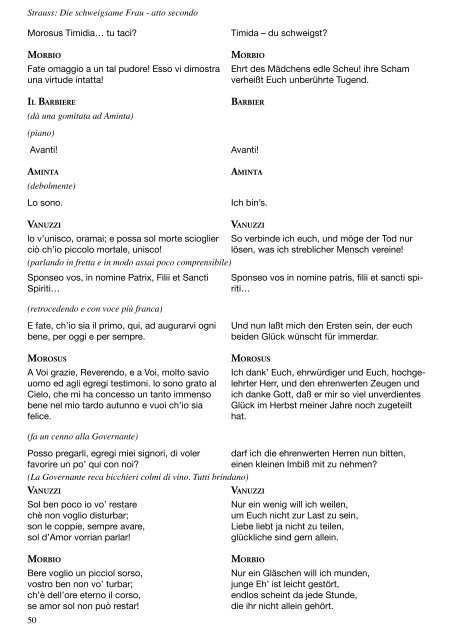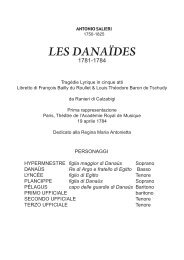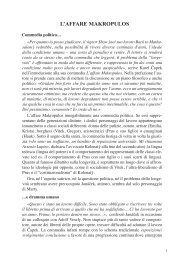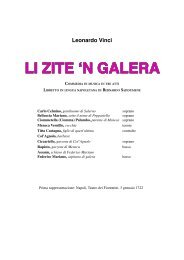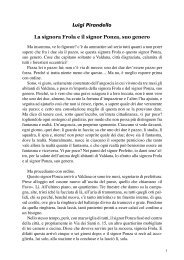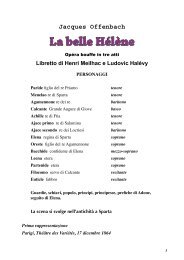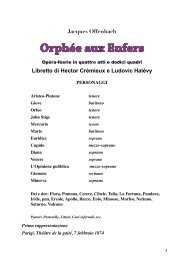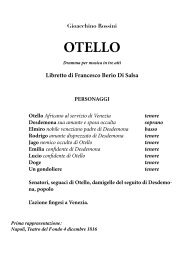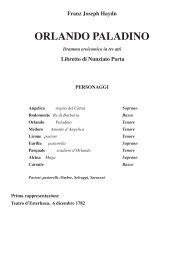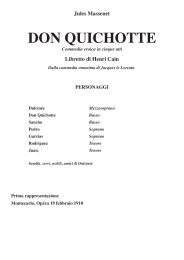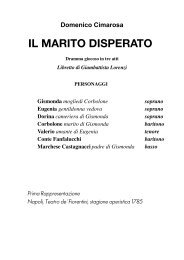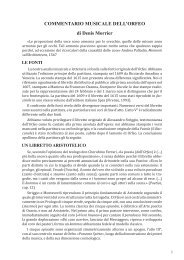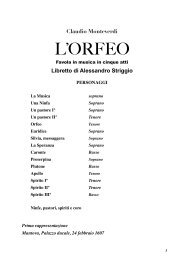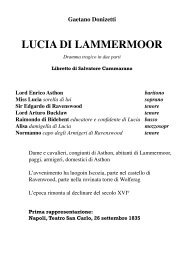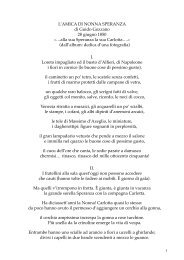La donna silenziosa lib bil.indd - benvenuto a «di cose un po
La donna silenziosa lib bil.indd - benvenuto a «di cose un po
La donna silenziosa lib bil.indd - benvenuto a «di cose un po
Create successful ePaper yourself
Turn your PDF publications into a flip-book with our unique Google optimized e-Paper software.
Strauss: Die schweigsame Frau - atto secondo<br />
Morosus Timidia… tu taci?<br />
MORBIO<br />
Fate omaggio a <strong>un</strong> tal pudore! Esso vi dimostra<br />
<strong>un</strong>a virtude intatta!<br />
IL BARBIERE<br />
(dà <strong>un</strong>a gomitata ad Aminta)<br />
(piano)<br />
Avanti!<br />
AMINTA<br />
(debolmente)<br />
Lo sono.<br />
Timida – du schweigst?<br />
MORBIO<br />
Ehrt des Mädchens edle Scheu! ihre Scham<br />
verheißt Euch <strong>un</strong>berührte Tugend.<br />
BARBIER<br />
Avanti!<br />
AMINTA<br />
Ich bin’s.<br />
VANUZZI<br />
VANUZZI<br />
lo v’<strong>un</strong>isco, oramai; e <strong>po</strong>ssa sol morte scioglier So verbinde ich euch, <strong>un</strong>d möge der Tod nur<br />
ciò ch’io piccolo mortale, <strong>un</strong>isco!<br />
lösen, was ich streblicher Mensch vereine!<br />
(parlando in fretta e in modo assai <strong>po</strong>co comprensi<strong>bil</strong>e)<br />
S<strong>po</strong>nseo vos, in nomine Patrix, Filii et Sancti<br />
Spiriti…<br />
(retrocedendo e con voce più franca)<br />
S<strong>po</strong>nseo vos in nomine patris, filii et sancti spiriti…<br />
E fate, ch’io sia il primo, qui, ad augurarvi ogni<br />
bene, per oggi e per sempre.<br />
MOROSUS<br />
A Voi grazie, Reverendo, e a Voi, molto savio<br />
uomo ed agli egregi testimoni. lo sono grato al<br />
Cielo, che mi ha concesso <strong>un</strong> tanto immenso<br />
bene nel mio tardo aut<strong>un</strong>no e vuoi ch’io sia<br />
felice.<br />
Und n<strong>un</strong> laßt mich den Ersten sein, der euch<br />
beiden Glück wünscht für immerdar.<br />
MOROSUS<br />
Ich dank’ Euch, ehrwürdiger <strong>un</strong>d Euch, hochgelehrter<br />
Herr, <strong>un</strong>d den ehrenwerten Zeugen <strong>un</strong>d<br />
ich danke Gott, daß er mir so viel <strong>un</strong>verdientes<br />
Glück im Herbst meiner Jahre noch zugeteilt<br />
hat.<br />
(fa <strong>un</strong> cenno alla Governante)<br />
Posso pregarli, egregi miei signori, di voler darf ich die ehrenwerten Herren n<strong>un</strong> bitten,<br />
favorire <strong>un</strong> <strong>po</strong>’ qui con noi?<br />
einen kleinen Imbiß mit zu nehmen?<br />
(<strong>La</strong> Governante reca bicchieri colmi di vino. Tutti brindano)<br />
VANUZZI<br />
Sol ben <strong>po</strong>co io vo’ restare<br />
chè non voglio disturbar;<br />
son le coppie, sempre avare,<br />
sol d’Amor vorrian parlar!<br />
VANUZZI<br />
Nur ein wenig will ich weilen,<br />
um Euch nicht zur <strong>La</strong>st zu sein,<br />
Liebe liebt ja nicht zu teilen,<br />
glückliche sind gern allein.<br />
MORBIO<br />
Bere voglio <strong>un</strong> picciol sorso,<br />
vostro ben non vo’ turbar;<br />
ch’è dell’ore eterno il corso,<br />
se amor sol non può restar!<br />
50<br />
MORBIO<br />
Nur ein Gläschen will ich m<strong>un</strong>den,<br />
j<strong>un</strong>ge Eh’ ist leicht gestört,<br />
endlos scheint da jede St<strong>un</strong>de,<br />
die ihr nicht allein gehört.


